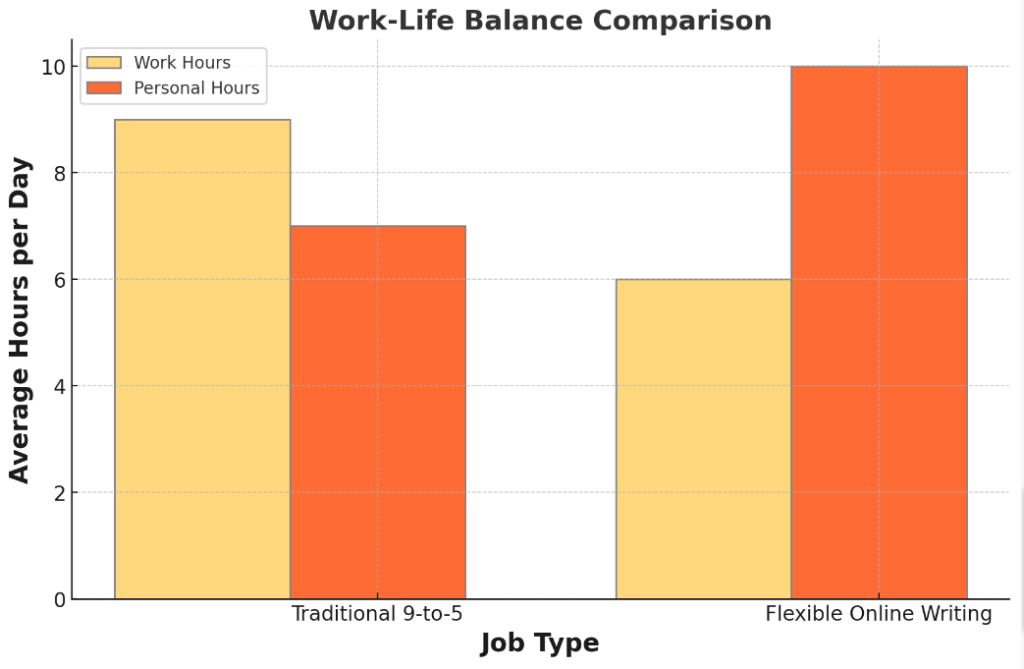Mastering Time Management: The Freedom of Online Writing
Introduction
In an era where the rigid confines of a 9-to-5 job have become increasingly stifling, the modern work paradigm is experiencing a revolutionary shift. The once-clear demarcations between professional life and personal space are blurring, giving rise to a demand for jobs that prioritize balance and flexibility. At the heart of this transformation is the burgeoning field of online professions, with online writing taking center stage.
For many, the dream of escaping tiresome commutes, office politics, and inflexible schedules is now an attainable reality, thanks to the plethora of online writing opportunities. From freelancers penning thought-provoking op-eds from the comfort of their bedrooms to digital nomads crafting marketing copy by the beach, the promise of “owning your time” has never been so vivid.
But what exactly makes online writing such a beacon of hope for those yearning for flexibility? Is it merely the freedom to choose one’s hours, or does it represent a deeper shift in our understanding of work and productivity? As we delve deeper into this topic, we’ll explore the nuances of online writing, demystifying its allure, and understanding how it truly allows writers to seize control of their most precious resource: time.
Understanding the Nature of Online Writing
In the broad spectrum of professions, writing has always held a unique place. Traditional writing roles, such as those in journalism, publishing, or advertising, often came with fixed locations, strict deadlines, and well-defined hierarchies. The advent of the internet, however, ushered in a new era for writers, enabling them to break free from many of these constraints.

Differences between Traditional and Online Writing Jobs:
- Location Independence: While traditional writing roles often tied individuals to newsrooms, offices, or specific locations, online writing can be done from anywhere with a stable internet connection. This has given birth to a generation of writers who are as comfortable working from a bustling café in Paris as they are from a quiet nook in their own home.
- Diverse Platforms: The digital space is vast. Writers now have the freedom to contribute to blogs, e-magazines, social media platforms, and various other online outlets, each with its own audience and stylistic requirements.
- Direct Interaction with Readers: In the past, feedback often came filtered through layers – editors, publishers, and critics. Online writing allows for immediate and direct engagement with readers, fostering a more interactive writing environment.
- Monetization Flexibility: With opportunities ranging from ad revenues, affiliate marketing, sponsored content, to subscription models, online writers have various avenues to monetize their craft, often with greater control over their earnings.
The Various Formats of Online Writing:
- Blogging: Personal websites or platforms like Medium and WordPress allow writers to share thoughts on myriad topics, from personal experiences to in-depth analyses.
- Copywriting: Brands and businesses are in constant need of compelling copy – be it for their websites, product descriptions, or ad campaigns.
- Content Creation for Digital Platforms: This encompasses writing for social media posts, video scripts, podcasts, and more.
- Technical and Academic Writing: This niche involves creating instructional manuals, scholarly articles, or in-depth reports.
- Freelance Journalism: Many news outlets and magazines now accept pitches and contributions from independent writers from around the globe.
In essence, online writing is characterized by its adaptability, its immediacy, and its democratization of the written word. It offers a playground where writers can experiment, innovate, and directly reap the rewards of their efforts, all while being masters of their own schedules.
Benefits of Flexible Timing in Online Writing
The allure of online writing extends beyond the mere act of putting words to a digital page. Its true charm lies in the unparalleled flexibility it offers. This flexibility manifests in various facets of a writer’s life, from personal to professional. Let’s explore these dimensions and understand why owning one’s time is the ultimate perk of online writing.
Work-Life Balance
Juggling personal commitments with professional aspirations: The freedom to choose when you work allows writers to seamlessly integrate their personal and professional lives. This means attending a child’s school play in the afternoon and making up for the work hours later in the evening, or perhaps taking a weekday off to recharge and working on a weekend instead. The rigid barriers that once separated “office hours” from “personal time” are rendered obsolete.
Finding time for self-care and mental well-being: The mental toll of a stringent 9-to-5 routine cannot be understated. The autonomy over one’s schedule means writers can take breaks when needed, indulge in hobbies, meditate, or simply take a walk, ensuring they are mentally and emotionally at their best when they do sit down to write.

Customized Productivity Windows
Recognizing personal peak productivity times: Not everyone is wired the same. Some find their creative juices flowing best at the break of dawn, while others are night owls. Online writing doesn’t force a uniform schedule. Instead, it lets writers identify and work during their personal peak productivity windows, ensuring optimal output and quality.
Crafting a work schedule around one’s natural rhythms: By aligning work hours with natural body rhythms, online writers often report higher levels of satisfaction, reduced fatigue, and enhanced creativity.
The Opportunity to Diversify
Balancing multiple projects or clients simultaneously: The flexibility factor also translates to diversification in projects. Writers can juggle different clients, genres, or types of assignments, preventing monotony and fostering continuous learning.
Venturing into related fields: Online writers aren’t restricted to just writing. Many take up related tasks like editing, content strategy, or even digital marketing, amplifying their skill set and income sources.
Eliminating Commutes and Office Politics
Saving time and energy by working from any location: The daily commute, often characterized by traffic jams or crowded public transport, is a significant drain on time and energy. Online writing eradicates this hassle, translating to more productive hours and a better state of mind.
Focusing on the task rather than office dynamics: Physical offices often come with their share of politics, distractions, and unnecessary meetings. Working remotely shields writers from these, allowing for a more focused and purpose-driven work environment.
In sum, the flexible timing in online writing is not just about choosing work hours. It’s about integrating work into one’s life in a harmonious manner, tapping into one’s most productive times, diversifying work to keep it interesting, and eliminating the stresses of traditional office life.
Challenges of a Flexible Online Writing Schedule
While the freedom and autonomy of online writing are undeniably attractive, they come with their own set of challenges. For some, the absence of a structured environment can be daunting, leading to pitfalls that can affect productivity and well-being. Recognizing these challenges is the first step toward effectively navigating them.
Overwork and Burnout
The danger of blurred boundaries between work and rest: Without a fixed start and end to the workday, it’s easy for online writers to lose track of time. There’s always another sentence to write, another pitch to send, or another email to answer. This can result in extended work hours, leading to fatigue and, eventually, burnout.
Recognizing and setting limits: Without the physical act of “leaving the office,” it’s crucial for online writers to mentally clock out. Setting clear work hours and sticking to them, taking regular breaks, and ensuring days off are essential to maintaining a sustainable work-life balance.
Isolation and Loneliness
The need for human interaction and collaboration: Humans are social creatures. The solitary nature of online writing can sometimes result in feelings of isolation or loneliness. The absence of office banter, team lunches, or simple face-to-face interactions can weigh heavy on some.
Strategies to stay connected in a remote environment: Thankfully, the digital age also offers solutions. Regular video calls with clients or collaborators, participating in virtual writer’s workshops, or simply having a co-working day with a friend can mitigate feelings of isolation.
Time Management Hurdles
Avoiding procrastination and distractions: The freedom to set one’s own schedule can sometimes backfire. Without the immediate oversight of superiors or the hum of a working office, procrastination can creep in. Home distractions, be it family, pets, or the allure of the couch and TV, can also hinder productivity.
Implementing effective productivity tools and methods: Effective time management is the cornerstone of successful online writing. Using tools like Trello or Asana for task management, setting clear daily or weekly goals, and employing techniques like the Pomodoro method can help writers stay on track.
In essence, while the flexible schedule of online writing provides unmatched freedom, it also demands a heightened sense of responsibility and self-awareness. By acknowledging potential pitfalls and actively implementing strategies to overcome them, writers can truly harness the potential of their flexible schedules.
Strategies for Thriving in an Online Writing Career with Flexibility
To truly thrive in the realm of online writing, flexibility should be more than just a perk—it should be a tool, a resource, and a mindset. Here are strategies that successful online writers adopt to harness the power of flexibility while minimizing its potential pitfalls.
Establish a Routine, But Stay Adaptable
The importance of structure in a flexible environment: Having a general routine provides a framework for the day, ensuring consistent productivity. This could involve designating certain hours for deep work, intervals for breaks, and time for administrative tasks like replying to emails.
Being adaptable within the routine: While having a routine is beneficial, it’s equally important to remain adaptable. If, for example, creativity is soaring during a typical “break time”, it might be worth pushing through and adjusting break times accordingly.
Create a Designated Workspace
Delineating work from rest: Having a specific place in the home or a chosen location for work can signal the brain that it’s “work time”. This dedicated space helps minimize distractions and mentally separates professional tasks from leisure activities.
Invest in Continuous Learning
Staying updated with industry trends: The online writing sphere is dynamic, with evolving trends, platforms, and audience preferences. Dedicate some flexible hours each week to learn about these changes, be it through webinars, online courses, or reading industry-related articles.
Broadening skills for diverse opportunities: Diversifying skills—like learning basic SEO, graphic design, or digital marketing—can open up more opportunities and increase one’s value proposition as an online writer.
Network Actively
Building relationships in a virtual world: Networking isn’t limited to physical events or office corridors. Joining online writing communities, participating in webinars, or even engaging on platforms like LinkedIn can help build valuable relationships.
Collaboration over competition: Engage with fellow writers, share opportunities, seek feedback, and collaborate on projects. This not only enriches the writing journey but also creates a sense of community.
Prioritize Health and Well-being
Ensuring regular breaks: Take short breaks to stretch, walk, or even do a quick workout. This not only boosts physical health but also refreshes the mind, enhancing creativity.
Integrating work with hobbies and passions: Allocate flexible hours to pursue hobbies or learn new skills. This ensures a holistic development, making the writing process more enriched and informed.
In conclusion, thriving in an online writing career is a blend of structure and spontaneity. By establishing routines, continuously learning, actively networking, and prioritizing well-being, writers can navigate the vast and versatile landscape of online writing with confidence and grace.
Success Stories: Writers Who’ve Mastered the Art of Flexibility
Across the digital landscape, numerous writers have not only embraced the flexibility offered by online writing but have transformed it into a fine art. Their journeys provide valuable insights and serve as inspiration for aspiring online writers. Let’s delve into a few of these success stories.

The Digital Nomad: Sarah’s Journey
Sarah began her career as a financial analyst in a bustling city but always felt the urge to travel and discover the world. Leveraging her analytical skills, she started writing financial blogs and soon expanded to travel writing.
Today, she seamlessly integrates her work with her travels, chronicling her adventures and offering financial tips for fellow travelers. Her blog, “Nomadic Finances”, receives thousands of views monthly, and she’s become a sought-after name in the travel-writing niche.
The Multifaceted Maven: Raj’s Evolution
Raj was a software engineer with a penchant for writing. He began by penning technical blogs and soon realized the vast scope of online writing. Over time, Raj diversified, taking on projects ranging from copywriting for startups to crafting e-novels. The flexibility of online writing allowed him to manage multiple projects, all while nurturing his love for fiction writing. His debut e-novel, “Digital Dreams”, was a bestseller on several platforms.
The Stay-at-Home Mom Turned SEO Expert: Lisa’s Transformation
Lisa, a stay-at-home mom, started a parenting blog to share her experiences and connect with other mothers. As she delved deeper into the online writing realm, she recognized the significance of SEO. Investing time in learning SEO techniques, Lisa not only amplified her blog’s reach but also started offering freelance SEO writing services. Today, she balances her role as a mom with her successful career, all from the comfort of her home.
The Academic Aficionado: Dr. Jamal’s Virtual Classroom
Dr. Jamal, a professor of history, was passionate about making education accessible to all. He began by writing insightful articles on historical events, gradually moving to online courses. The flexibility of online writing enabled him to reach a global audience, breaking geographical barriers. His courses on “World Civilizations” are now popular on multiple e-learning platforms.
The Small-Town Girl with Big Dreams: Maria’s Global Footprint
Maria hailed from a small town with limited professional opportunities. Online writing became her gateway to the world. She started by writing articles for local e-magazines and soon caught the attention of global publications. Today, her articles on “Sustainable Living” are featured in renowned international magazines, all penned from her quaint hometown.
These stories underscore the transformative power of online writing. They highlight how flexibility, when coupled with passion, skill, and determination, can craft success stories that inspire and resonate across borders.
Tips to Get Started and Embrace Flexibility in Your Writing Career
If you’re feeling inspired to venture into the world of online writing and enjoy the flexibility it promises, it’s essential to have a roadmap. Beginning such a journey without guidance can be overwhelming. Here are some actionable tips to ensure your foray into online writing is structured, strategic, and successful.

Identify Your Niche
Find your passion: Your writing will always be more authentic and engaging when it’s about a topic you’re genuinely passionate about. Are you a tech enthusiast, a travel junkie, or a gourmet chef at heart? Your unique interests can guide your writing niche.
Research market demand: While passion is crucial, it’s equally important to ensure there’s a market demand for your chosen niche. Tools like Google Trends or keyword research tools can provide insights into popular topics.
Build a Strong Portfolio
Start small: Initially, focus on creating high-quality content rather than quantity. Whether it’s blog posts, articles, or short stories, ensure each piece reflects your best work.
Use platforms to showcase: Websites like Medium, LinkedIn, or even a personal blog can serve as platforms to display your work. Over time, this portfolio becomes your credibility stamp in the online writing world.
Constantly Upgrade Your Skills
Embrace online courses: Platforms like Udemy, Coursera, or Skillshare offer a plethora of courses on writing, SEO, digital marketing, and more. Regularly updating your skills keeps you competitive.
Participate in webinars and workshops: These not only enhance your skills but also provide networking opportunities.
Engage with the Writing Community
Join online writing forums: Websites like WritersCafe or the Absolute Write Water Cooler can be valuable resources for feedback, opportunities, and support.
Collaborate on projects: Engage with other writers, editors, or content creators for collaborative projects. This enhances your exposure and diversifies your experience.
Stay Consistent and Patient
Consistency is key: Like any other profession, online writing requires consistency. Regularly updating your blog, sending out pitches, or writing articles ensures steady growth.
Embrace rejections: Every writer, no matter how skilled, faces rejections. Instead of being disheartened, use them as learning opportunities.
Set Clear Boundaries
Designate work hours: Even in a flexible schedule, it’s vital to have designated work hours to maintain a work-life balance.
Communicate your schedule: If you’re working with clients or collaborators across time zones, ensure they’re aware of your working hours to avoid unnecessary stress.
Embarking on an online writing journey with an emphasis on flexibility can be incredibly rewarding. With the right strategies, a growth mindset, and a sprinkle of patience, the digital realm can offer unparalleled opportunities to budding writers. Remember, every great writer started with a single word. Your journey begins now.
The Challenges of Flexibility: What to Watch Out For
While the allure of flexibility in online writing is undeniable, it comes with its own set of challenges. Being aware of these can help you navigate them more effectively and ensure your journey is more smooth-sailing than stormy.
Procrastination and Lack of Motivation
The double-edged sword: Flexibility means you often get to choose when you work. But without a fixed routine or external pressures, it’s easy to keep pushing tasks to “later”.
Solutions: Implementing techniques such as the Pomodoro Technique, setting clear daily goals, and creating a to-do list can help in maintaining focus and reducing procrastination.
Distractions at Home
Home isn’t always serene: Those working from home, especially in a busy household or without a designated workspace, can find it challenging to concentrate.
Solutions: Create a specific workspace, use noise-cancelling headphones, or consider co-working spaces or cafes for a change in environment.
Overworking and Burnout
No clear line between work and rest: The freedom to work anytime can sometimes translate to working all the time, leading to quick burnouts.
Solutions: Designate specific work hours, ensure regular breaks, and prioritize self-care activities like exercise, meditation, and hobbies.
Isolation and Lack of Social Interaction
Missing the office chatter: Working online can sometimes be lonely without the daily interactions of a traditional office.
Solutions: Engage in networking events, consider collaborative projects, join online communities, or work from shared spaces occasionally.

Handling Irregular Income
Unpredictable paydays: Unlike traditional jobs with fixed salaries, online writing might bring fluctuating incomes, especially in the initial stages.
Solutions: Diversify your writing projects, save during peak months, and consider having a financial buffer or secondary source of income.
Keeping Up with Rapid Industry Changes
The digital world evolves quickly: With changing algorithms, audience preferences, and platform rules, what works today might not work tomorrow.
Solutions: Dedicate time to stay updated, attend webinars, workshops, and invest in continuous learning.
Managing Multiple Roles
Wearing many hats: As an online writer, you might find yourself being the content creator, marketer, editor, and manager, all in one.
Solutions: Consider collaborating with professionals (like editors or graphic designers) and using tools to streamline tasks (e.g., project management tools, grammar checkers).
In embracing the flexibility of online writing, being aware of these challenges prepares you for the road ahead. By strategizing, being proactive, and occasionally seeking external support, you can ensure that the scales tip more towards the benefits of flexibility than the challenges.
Embracing the Future: The Long-Term Viability of Online Writing
As the digital world continues its expansive growth, it’s natural to question the sustainability of an online writing career. Will the flexibility and opportunities remain consistent, or is this a fleeting phase? Let’s explore the long-term viability of online writing.
The Shift Towards Digital Media
Growing digital consumption: With the rise of smartphones, tablets, and improved internet connectivity worldwide, people are consuming content predominantly online. Newspapers, magazines, and even academic journals are transitioning to digital formats.
What it means for writers: The demand for online content, be it articles, blogs, e-books, or social media posts, is likely to increase, ensuring steady opportunities for online writers.
Diversification of Content Platforms
Not just blogs and articles: The realm of online content is expanding. Podcast scripts, video scripts for platforms like YouTube, online course content, and interactive posts for platforms like Instagram and TikTok are becoming equally relevant.
What it means for writers: A broader spectrum of content types ensures that writers can diversify, adapting to changing trends and platforms.
Continuous Evolution of SEO
Search engines are here to stay: As long as people use search engines to find information, SEO (Search Engine Optimization) will remain relevant. However, the algorithms and best practices will continuously evolve.
What it means for writers: Writers who stay updated on SEO trends and adjust their content accordingly will always be in demand.
The Rise of Personal Branding
Brands want a human touch: Companies and individuals are focusing on personal branding, understanding that audiences connect better with human stories and experiences.
What it means for writers: Personal stories, relatable content, and brand narratives will be sought after, creating niches for writers who can craft such content.
Automation and AI: A Threat or Opportunity?
The AI wave: There’s growing concern about AI tools taking over content creation, given advancements in tools that can generate articles or reports.
What it means for writers: While AI can handle specific repetitive content tasks, the human touch – creativity, emotion, and unique perspective – is irreplaceable. Writers who focus on originality, creativity, and human connection will continue to be valuable.
Remote Work Culture: The New Norm
The post-pandemic world: Many companies have acknowledged the viability of remote work post the COVID-19 pandemic. This shift is likely to stay, given the benefits of reduced overhead costs and global talent accessibility.
What it means for writers: The acceptance of remote work means companies are more open to hiring freelance writers from across the globe, expanding opportunities manifold.
In conclusion, the future of online writing appears promising. The key lies in adaptability, continuous learning, and understanding that while formats and platforms might change, the essence of impactful writing – connecting with the reader – remains constant.

